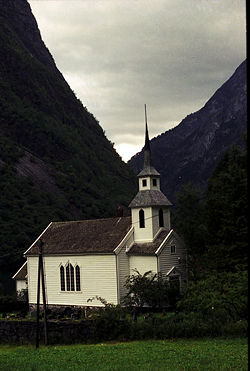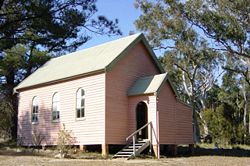Church (building): Difference between revisions
imported>Pat Palmer mNo edit summary |
imported>Pat Palmer mNo edit summary |
||
| Line 1: | Line 1: | ||
{{subpages}} | {{subpages}} | ||
{{Image|Country church in Sogn.jpg|right|250px|A country church in typical style. Sogn, Norway.}} | {{Image|Country church in Sogn.jpg|right|250px|A country church in typical style. Sogn, Norway.}} | ||
{{dambigbox| | {{dambigbox|Church (building)|Church}} | ||
In most [[Christian]] denominations, the physical house of worship is usually called a '''church'''<ref>[[Quakers]]are an exception; they tend to refer to the building where they congregate as the "meeting house" or simple "meeting".</ref>. (The term is also used for Christian religious bodies, and a few non-Christian ones.) | In most [[Christian]] denominations, the physical house of worship is usually called a '''church'''<ref>[[Quakers]]are an exception; they tend to refer to the building where they congregate as the "meeting house" or simple "meeting".</ref>. (The term is also used for Christian religious bodies, and a few non-Christian ones.) | ||
Latest revision as of 19:49, 29 September 2020
In most Christian denominations, the physical house of worship is usually called a church[1]. (The term is also used for Christian religious bodies, and a few non-Christian ones.)
There is no prescribed rule for the architecture of a church building, they may be simple huts or ornate cathedrals in any architectural style. Gothic and neo-gothic styles are common. Churches are often marked with a cross on the ? of the roof; the style of the cross sometimes give a clue as to the denomination.
Where churches are large enough to have divided areas, these are the chancel, which houses the altar and is where the ministers officiate, and the nave, where the congregation sit or stand.
Other parts of churches are:
- Sacristy – purpose-built rooms such as the choir sacristy, where the choristers rehearse, and the working sacristy, in which linens, chalices and the like are cleaned and stored.
- Choir loft; choir stalls – where the choristers sit and sing from; these may be in the front of the church, in the chancel, or at the back in an actual loft.
- Chapels-large churches and cathedrals may have chapels for small services and private prayer.
Attachments and outbuildings in a church may include:
- Church hall or common room
- Minister’s study
- Church office
- Parish house
- Rectory
- ↑ Quakersare an exception; they tend to refer to the building where they congregate as the "meeting house" or simple "meeting".

